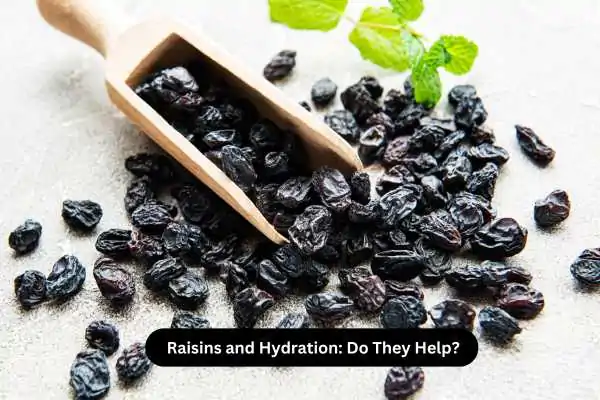Raisins are a common pantry staple in many UK homes. Naturally sweet, convenient, and packed with nutrients, they are often enjoyed as a snack or added to porridge, salads, and baked goods. But beyond their obvious appeal, there’s growing curiosity around their role in hydration. Can these tiny dried fruits actually help keep the body hydrated?

This article explores the connection between raisins and hydration, examining the nutritional content of raisins and their impact on fluid balance and overall wellbeing.
What Are Raisins?
Raisins are dried grapes, typically made from seedless varieties such as Thompson or Sultana. Through the drying process, grapes lose most of their water content, leaving behind a dense source of sugars, fibre, vitamins, and minerals.
While raisins are often praised for their energy-boosting properties, some people question whether a dried fruit like this could have any role in supporting hydration—especially since water is removed during drying.
Understanding Hydration
Hydration is the process of maintaining adequate fluid levels in the body. Water plays a critical role in nearly every bodily function, from regulating temperature and aiding digestion to transporting nutrients and removing waste.
Most hydration comes from drinking fluids, but foods can also contribute to your daily water intake—particularly fruits and vegetables with high water content. However, dried fruits like raisins contain very little water, so they aren’t considered hydrating in the traditional sense.
So, where does the confusion come from? It lies in the indirect benefits raisins may offer in supporting the body’s hydration balance.
Electrolytes and Natural Sugars in Raisins
Although raisins are low in water, they contain natural sugars and important electrolytes that play a role in hydration and fluid regulation. Here’s how:
1. Potassium Content
Raisins are an excellent source of potassium—a key electrolyte that helps regulate fluid balance in the body. Potassium works alongside sodium to maintain cellular hydration and support muscle function. Just a small handful (around 30g) of raisins provides roughly 320mg of potassium, which is about 9% of the recommended daily intake.
2. Natural Sugars
The natural glucose and fructose found in raisins can help with energy replenishment during physical activity. When consumed with water, these sugars can assist in improving water absorption in the small intestine. This is especially relevant for athletes or individuals engaging in moderate to intense exercise, where fluid and energy losses occur simultaneously.
Raisins in Rehydration Scenarios
While raisins alone won’t hydrate you like a glass of water or a piece of watermelon, they can play a supporting role when combined with proper fluid intake. For example:
-
Post-workout recovery: Consuming raisins with water or an electrolyte drink can help replenish lost sugars and minerals.
-
Mild dehydration support: Pairing raisins with high-water foods or fluids may enhance hydration efficiency due to their potassium content.
Some natural rehydration remedies across cultures even include soaking raisins in water overnight, allowing them to reabsorb moisture. The resulting “raisin water” is then consumed in the morning, believed to offer gentle detox and hydration benefits. While this is more anecdotal than scientifically backed, it does illustrate how raisins can be included in hydration strategies.
The Role of Fibre in Fluid Balance
Raisins are also a rich source of dietary fibre, particularly soluble fibre. Soluble fibre can help retain water in the digestive tract, which supports regular bowel movements and overall digestive health. While this isn’t the same as direct hydration, it contributes to the efficient use of fluids within the body.
However, it’s important to balance fibre intake with adequate water consumption. Eating large amounts of dried fruit without enough water can actually lead to dehydration or digestive discomfort.
When Raisins May Not Help
Despite their nutritional value, there are some scenarios where raisins aren’t ideal for hydration:
-
High sugar sensitivity: The natural sugars in raisins, although healthier than refined sugars, can cause blood sugar spikes if consumed in large amounts without physical activity.
-
Low fluid intake: If raisins are eaten without sufficient water, they can have a dehydrating effect due to their concentrated nature and fibre content.
As such, raisins should always be part of a balanced hydration routine, not a replacement for water or hydrating foods.
Best Ways to Include Raisins for Hydration Support
If you’re looking to incorporate raisins into your diet in a way that supports hydration, consider the following:
-
Snack Smart: Pair a small handful of raisins with a glass of water or herbal tea.
-
Add to Hydrating Meals: Sprinkle raisins on top of porridge made with water or milk.
-
Use in Trail Mix: Combine raisins with seeds, nuts, and coconut flakes as a recovery snack, followed by fluid intake.
-
Try Raisin Water: Soak 10–15 raisins overnight in a glass of water, then drink the water in the morning as a light and natural refreshment.
Final Thoughts
Raisins may not hydrate you directly, but they do contain essential nutrients—especially potassium—that contribute to the body’s hydration processes. When consumed as part of a balanced diet with sufficient fluid intake, they can support your overall hydration status, particularly in active lifestyles.
In short, while raisins alone won’t quench your thirst, they can help your body manage fluids more effectively when paired with proper hydration habits. So the next time you’re reaching for a snack, consider a handful of raisins—just don’t forget the water.

